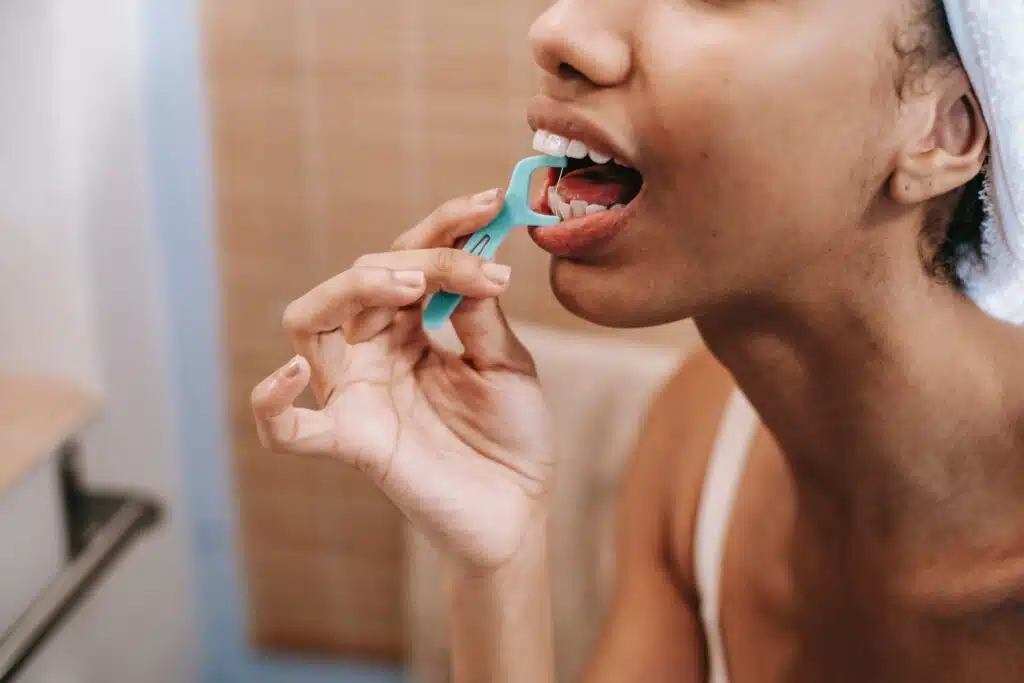Preventing plaque from accumulating around your teeth is critical to oral health, a healthy smile, and good overall health. Unfortunately, the American Dental Association states that only sixteen percent of Americans floss at least once each day. The common reasons for not flossing include the time needed to floss, the pain caused when flossing, and that flossing causes bleeding. Learning more about flossing can help you save your teeth and improve your overall health. Schedule an appointment with Trident General Dentistry today!
Why is Flossing Important?
The reason dentists and dental hygienists emphasize flossing is because they know the importance of flossing and the consequences of not flossing. You may never miss a day brushing your teeth, but the habit of flossing may surpass brushing for keeping your teeth and gums healthy. Flossing is essential for several reasons, including:
-
Flossing cleans between your teeth. A tooth has five surfaces, and you can clean three of these with brushing. However, only dental flossing thoroughly cleans the sides of your teeth. Plaque that accumulates on the sides of your teeth can cause cavities that often require large dental fillings or crowns to restore the tooth.
-
Flossing helps prevent gum disease. Brushing does not remove plaque that accumulates under the gum line. Daily flossing can help prevent gingivitis by removing this plaque.
-
Flossing may help avoid some medical conditions. Studies continue to show increasing evidence that a link exists between gum disease caused by dental plaque and various medical conditions. Some of these are serious diseases such as heart problems, diabetes, rheumatoid arthritis, and Alzheimer’s disease.
-
Flossing keeps your breath fresh. Dentists and dental hygienists can usually tell if a person flosses before examining their teeth and gums. Flossing is an easy way to avoid halitosis caused by plaque.
-
Flossing protects your bright smile. Flossing helps keep your teeth white and free of cavities and gum disease that can damage your teeth and your smile.
What Type of Floss Should I Use?
There are many floss options depending on your specific needs. Trident General Dentistry can help you choose the best dental floss to keep your teeth and gums healthy. Although you have many options, these tips can help make choosing easier.
-
Waxed floss fits well in tight spaces but can shred or break easily.
-
Unwaxed floss has a waxed coating that resists breaking but is more difficult to slide into tight spaces.
-
Dental tape is wider than string floss and works well for people with larger spaces between their teeth.
-
Super floss has stiff sections on each end and helps clean around bridges or orthodontic braces.
-
All the above include the mint-flavored option, a popular choice for flossing after a meal to freshen breath.
-
Floss holders can help if you have difficulty holding floss with your fingers or lack the flexibility to floss all areas of your mouth.
When Should I Floss?
The American Dental Association recommends flossing your teeth once each day, and it doesn’t matter when. What is important is how you floss, instead of when you floss as long as it’s within a 24-hour period. It takes plaque that long to accumulate, so removing it daily is what is most important.
Some people recommend flossing at night before going to bed. If you can floss at this time, then that would be a suitable option. However, flossing earlier would be better if you think you would be too tired in the evening to floss thoroughly. Floss your teeth when you know you have time to do it well each day.
It also doesn’t matter if you floss before or after brushing. Whatever works for you is the best; just do it every 24 hours. One recent study found that Americans are almost evenly divided about flossing before or after brushing.
What Should I Do If My Gums Bleed When I Floss?
If you haven’t flossed in a while, you have inflamed gums. It is normal and expected that flossing inflamed gums causes bleeding. However, you should not stop flossing if your gums bleed. This will stop in a couple of days if you floss regularly and adequately. Once you have healthy gums, they will not bleed.
What About Using Interdental Flossers and Water Flossers?
Most dentists recommend that you use interdental flossers and water flossers to supplement flossing with one of the traditional dental floss options. Although some recent studies show that these adjunctive devices clean between your teeth as well, conventional dental floss has stood the test of time as the gold standard interdental cleaner.
How Should I Floss My Teeth?
You will receive detailed instructions from Trident General Dentistry on how to floss. Here are some tips to keep in mind when you floss:
-
Use about 18 inches of floss. Wind a lot of it around the middle finger of one hand and the rest around the middle finger of the other hand.
-
Grasp the floss tightly between your thumbs and index fingers.
-
Use a gentle back and forth motion to slide the floss between your teeth.
-
Gently curve the floss around your tooth in a “C” shape as it slides beneath the gum line between the gum and tooth.
-
Place firm pressure against the tooth and move the floss up and down.
-
Clean the sides of adjacent teeth.
-
Move around your entire mouth and remember to floss the back side of your last teeth.
Book an Appointment
Learn more about how to keep your teeth and gums healthy. Schedule an appointment with Trident General Dentistry today!

